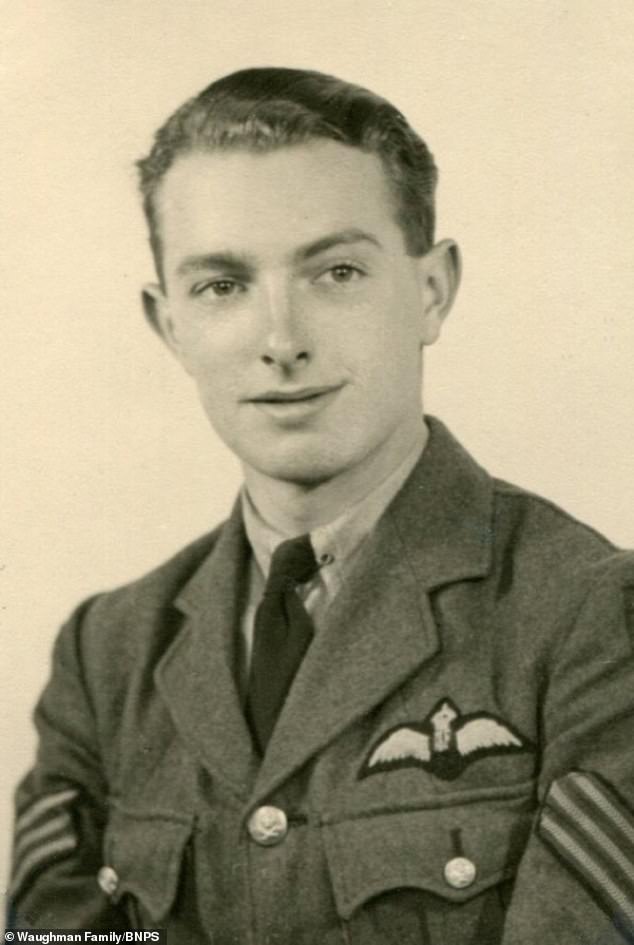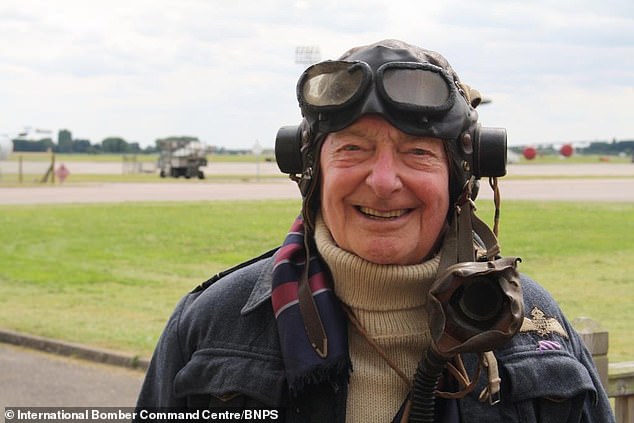RAF WW2 hero praised by King Charles who survived a mid-air collision and 30 bombing missions over Hitler’s Nazi Germany dies aged 100
A World War II RAF hero who survived a mid-air collision and 30 bombing raids over Hitler's Nazi Germany has died aged 100.
Pilot Officer Russell 'Rusty' Waughman was previously praised by King Charles for his efforts during the most intense periods of the war.
His son Pete Waughman said Rusty died peacefully earlier this week surrounded by family at his home in Kenilworth, Warwickshire.
Earlier this year the King met Rusty and other veterans of Bomber Command at RAF Coningsby, Lincolnshire, during a visit to mark the 80th anniversary of the Dambusters attack.
He told the audience, “Thank God for all these men – people like you who took care of us.”
Pilot Officer Russell 'Rusty' Waughman, praised by King Charles, has died aged 100

Originally from Shotley Bridge, County Durham, Rusty was just 20 years old when he started flying with 101 Squadron in November 1943.
Rusty was part of 101 Squadron which carried out special operations and had one of the highest casualty rates in Bomber Command.
After completing his tour of 30 operations in June 1944, his group captain told his crew that they were the first to accomplish this in six months.
The lifespan of a typical aviator at the time was only a handful of flights.
One raid on Leipzig saw the loss of 76 aircraft and a subsequent operation on Haselt collided with another Lancaster bomber in the skies over Belgium.
Miraculously, Rusty managed to bring the Lancaster home and make an emergency landing at the base, with his crew unharmed. The other crew members of the Lancaster were all killed.
Rusty later survived an operation to Munich after losing part of their port wing and returned from a disastrous attack on Nuremberg in March 1944, with the loss of 97 aircraft.
In the run-up to D-Day, he carried out bombing raids on railway yards in Nazi-occupied France and the tank depot at Mailly-le-Camp, where his Lancaster was blown upside down.
Its last flight took place on June 5, 1944, the day before D-Day, when they used their ABC Radio Countermeasure Equipment to listen to the transmission of German fighter planes and jam their transmissions.
Rusty was involved in the Berlin Airlift after the end of the war and became an instructor and examiner with 30 Squadron Transport Command.
He received the Distinguished Flying Cross and the Air Force Cross before resigning in 1952 to care for his ailing wife. He remained in the Reserve of Officers until 1960.
He spent his final years in Kenilworth and was heavily involved in Bomber Command commemorations, once receiving a ten-minute standing ovation after a moving speech.
Pete said: 'It was very unusual for someone from Bomber Command to complete a tour as the turnover was so high.
'Dad considered himself very lucky, but I think you make your own luck.
“Talking to him and his crew when they were alive, you could see how close they were and how much they trusted each other.
“He loved his family and we are all very proud of him.
“It was a peaceful end for him surrounded by his family.”
Rusty was described as a “wonderful gentleman” by members of the Bomber Command veteran community.
The International Bomber Command Center (IBCC) said: 'It is with great sadness that we announce the death of Pilot Officer Russell 'Rusty' Waughman DFM, AFM and Ld'H, who passed away last night at the age of 100.
'We extend our sincere condolences to his sons Ian and Peter and the rest of the family.
“Rusty was a beloved friend and supporter of the IBCC.
'He had visited the center and the monument many times, and it was always a great pleasure to spend time with him.
“We were thrilled when Rusty agreed to be our guest speaker at the Bomber Command Day Dinner in July 2022.
'His ten-minute standing ovation from the guests was a testament to the quality of his speech, which he delivered without notes.
“We thank you for all you have done for your country and for your support of the IBCC.
“What a wonderful gentleman and we will miss you dearly. Lest we forget.'

His son Pete Waughman said Rusty died peacefully earlier this week surrounded by family at his home in Kenilworth, Warwickshire.
Aviation historian Steve Darlow said it was “a testament to his skill” that Rusty completed a tour under such difficult circumstances.
He said: 'Rusty was operational during one of the most important periods during the Second World War, the Battle of Berlin, at which point Bomber Command sent out hundreds of aircraft every night to contend with German night fighters, searchlights, anti-aircraft guns and enemy defenses. .
'It was quite an achievement to survive. He said it was a matter of luck, but I think it was a testament to his skill.
'He said that the attack on Nuremberg, in which so many planes were lost, would remain with him forever.
'In the run-up to D-Day he bombed railway yards and tank depots, and later was involved in the Berlin Airlift.
“Rusty was such a generous, warm man and always wanted to know everything about you, while everyone else wanted to know about him.”
Sywell Aviation Museum said: 'We are saddened to learn that Flt Lt Russell Rusty Waughman DFC AFC has sadly passed away just before his 101st birthday.
“He completed a tour of operations, which started during the Battle of Berlin, where they conducted several operations.
'Rusty and his crew survived a mid-air collision, but managed to write off the plane upon landing. On a subsequent flight, Rusty and his crew made a miraculous escape when their plane was blown upside down over the target at Mailly-le-Camp.
'They also survived the attack on Nuremberg on 30 March 1944, when 97 aircraft were lost – including about a quarter of the 101 Sqn strength that night.
'Our sincere condolences to his family and friends. Blue sky Rusty.'
Of the 135,000 aircrew who served with Bomber Command during World War II, 55,000 were killed, a mortality rate of 44 percent.
Originally from Shotley Bridge, County Durham, Rusty was just 20 years old when he started flying with 101 Squadron in November 1943.
